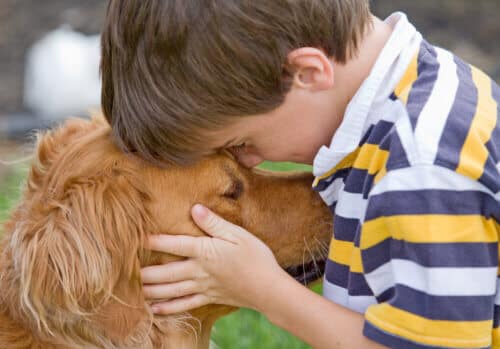"The discussion is always about what the dog contributes to man, and there are even opinions that accuse humanity of exploiting other species. The findings of the innovative research by CLEVER DOG LAB and TECH4ANIMALS suggest that the dog also benefits from the interaction," said Prof. Anna Zamansky from the University of Haifa

The special bond between humans and dogs is known - certainly to all dog lovers - and indeed, studies conducted have found, for example, that when humans are with their friends on all fours, specific areas of the brain associated with connection and emotion are activated
The dogs love us as much as we love them. A new international study in collaboration with the University of Haifa published in the prestigious journal Scientific Reports From NATURE found for the first time that areas of the dog's brain responsible for connection and emotion are active when it recognizes images of its owner. "In psychology, attachment theory is used to explain the bond between mother and baby. Recently, there are increasing indications that the Torah is also relevant to explain the relationship of a person to his dog. And our study brings up new indications for this for the first time", said Prof. Anna Zamansky from the Department of Information Systems, the study's editor.
An ancient connection
The special bond between humans and dogs is known - certainly to all dog lovers - and indeed, studies conducted have found, for example, that when humans are with their friends on all fours, specific areas of the brain related to connection and emotion are activated. In a study conducted among mothers, there was an indication that looking at their dogs activates areas similar to those that are activated when looking at their babies. But what about the dogs? Is it also a special relationship for them with their husbands or do we "throw" our feelings on them?
In the current study conducted in collaboration between a group of researchers from the CLEVER DOG LAB from the Medical University of Vienna, which studies dog cognition, and Prof. Zamansky, head of the Tech4Animals laboratory, the researchers wanted to check, similar to the studies conducted on humans, how the dog reacts when it is presented with pictures of its owners, compared to Pictures of strangers.
Brain scan
In order to conduct this extraordinary study, the researchers were first required to perform a brain scan of the dogs using a functional magnetic resonance imaging (fMRI) system, something that is done in a small number of places in the world as it requires expensive equipment and the ability to train dogs to lie down without moving in a machine. The researchers found that the areas that became active in the brain when the dog looked at the picture of its owner, are similar to those that light up in humans, responsible for emotion and attachment. On the other hand, looking at a stranger lit up other areas.
In the second stage, the researchers looked at the eye movements of the dogs with the help of EYE TRACKING, and here too a preference for looking at the owner was observed.
In the third stage, the researchers from Vienna, where the brain scans were performed, were brought to Prof. Zamansky's laboratory, which specializes in the study of animal behaviors with the help of systems based on artificial intelligence, and performed an automatic analysis of the dogs' behavior - where they look and where they choose to go after being exposed to their owner's images. Findings in this section also supported the hypothesis of the dog's preference for the image of its owner.
"The special relationship between dogs and people has been studied for many years, but only recently has scientific evidence been shown that the interaction of a person with a dog causes a reduction in stress, a lift in mood, a reduction in feelings of loneliness and even chronic pain. Children's interaction with dogs even accelerates cognitive and emotional development. The discourse is always about what the dog contributes to man, and there are even opinions that accuse humanity of exploiting other species. The findings of the innovative research by CLEVER DOG LAB and TECH4ANIMALS suggest that the dog also benefits from the interaction," said Prof. Zemanski.
More of the topic in Hayadan:
- How many dog years equals a human year? Explanation of calculating the age of dogs
- A dog is a dog is a dog is a dog is a dog
- Adult wolves miss their handler when separated from them, just like dogs
- What is allowed to be given to dogs to eat and what is not. Cut and save
- Housing for an older dog: how dogs' personalities change over the years of their lives

3 תגובות
Indeed, interesting articles on the science site!
But what about the pronunciation? You have many small and annoying mistakes that require a second reading to understand and sometimes it is even necessary to fill in the gaps. These are mistakes that are repeated on your page regularly - please pay attention.
Cats also love their owners
As a known cat lover and after thorough research that included thousands of YouTube videos, I am here to share the results of the research. It is clear that dogs love humans more. After all, when a person meets his dog after a long separation, it is the dog that jumps around the person with endless excitement, and not the other way around.